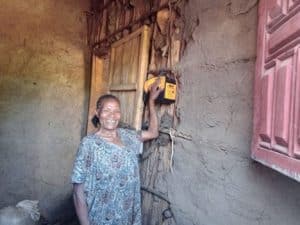Light improves life, especially during the evening.
For Asnakech, a mother of three children in the Abya woreda, Semero community, in Ethiopia, having light in her home has provided her family with many benefits.
However, it wasn’t always that way.
For decades, Asnakech’s family lived without electricity where the night’s darkness dominated her home because electricity wasn’t available, and kerosene was expensive with limited supply for purchase.
In fact, Asnakech isn’t alone. Most rural households in her village are using local energy sources, such as kerosene, dry batteries, and wood for lighting.
When you take a closer look, these local energy sources are expensive and aren’t readily available in rural villages. As well, traditional lamps are made from bottles and woof, which is a spin made of cotton put in the middle of the bottle that sucks the kerosene from the bottle and feeds it to the lamp on top. The fumes from these materials create respiratory infections for women and girls. What’s more, the high price caused Asnakech to ration these fuel sources, resulting in her family eating and going to bed early.
 The lack of light is a significant challenge for women and girls because they spend most of their time on activities for their families outside their home. In addition, once they complete their work in the fields, they prepare dinner for the family, clean the house, organize the sleeping area, and take care of the kids in in the dark. When the room is lit, the girls hold and move the lamp where the light is needed.
The lack of light is a significant challenge for women and girls because they spend most of their time on activities for their families outside their home. In addition, once they complete their work in the fields, they prepare dinner for the family, clean the house, organize the sleeping area, and take care of the kids in in the dark. When the room is lit, the girls hold and move the lamp where the light is needed.
To reduce women and girls’ workloads in the household and to help with children’s education, the VOICE for Women and Girls Program provided solar-power lamps to 140 co-operative members.
Asnakech was one of the women who received a solar-power lamp.
Her life changed.
Although she’s only been using the solar-power lamp since October 2023, she’s already seeing improvements. During the evening, family members see each other, listen to the radio, and stay up later. In addition, using a sustainable energy source is more environmentally friendly than firewood, which filled the home with smoke.
“Before the solar -power lamp, I bought kerosene for my children to help them read since they are in school.” Asnakech said. “On the other side of the house, we used firewood to get light in addition to cooking family meals.”
Asnakech also said the solar-power lamps lower daily expenses because she doesn’t have to buy as much kerosene while the solar light has allowed her children to complete their homework and read in the evening, leading to better school performance, and reading habits.
The solar-power lamp project in Abya woreda, Semero kebele, is one of many examples where the VOICE for Women and Girls Program is working with local co-operatives to help advance gender equality in Ethiopia.
VOICE for Women and Girls Program
VOICE for Women and Girls (VOICE), funded by the Government of Canada, is a volunteer cooperation program (2020-2028) that aims to strengthen the performance of developing country partner organizations to advance gender equality and economic empowerment of 50,000 co-operative and credit union members from marginalized communities in Ethiopia, Ghana, Kenya, and Malawi.
The program, supported by volunteers, strives to address the challenges and barriers that adversely affect the economic and social well-being of vulnerable groups, with particular emphasis on women and girls. VOICE aims to respond to the needs identified by these groups and to increase the capacities of individual producers and primary co-operatives, to support more inclusive, sustainable, and resilient growth. Supporting institutions such as apex organizations, co-operative unions, and government/regulatory bodies are also engaged to increase the capacity and prioritization of vulnerable groups.
CDF Canada recruits volunteers through its considerable network of industry associations, co-operatives, credit unions, employers, academic and training institutions in Canada and engage the co-operative community and general public to support Canada’s international development efforts through the implementation of its Feminist International Assistance Policy.